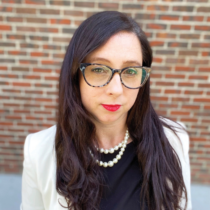Magazine

“Archives are for Everyone”
Meet Kate Donovan, the director of the Bancroft Library at the University of California, Berkeley. Her early archival training was done at the Bentley, and she’s part of our new series about great archivists doing important work in the field.
by Katie Vloet
Hi, Kate! Tell us what you do.
I am the director of the Bancroft Library and also associate university librarian for special collections. My job is incredibly varied and diverse, and a lot of the work involves documenting California and the West. I try to get the message out that archives are for everyone and that the Bancroft is free and open to everyone. In that way, I spend a lot of time as an ambassador.
I also have a talented and dedicated group of colleagues here at the library with whom I work to build our collections. The collections at the Bancroft document two thousand years of human history and include rare books, archives, literary manuscripts, photographs, letters, oral histories, and more.
What is something archived at the Bancroft that fascinates you?
I am very lucky in that my own family history is in this library. The Bancroft has land grant files and maps that were used by Californios [Hispanic Californians who descended from Spanish and Mexican settlers of the 17th through 19th centuries] to justify their claims to land. We’ve done a great job of digitizing all of those files and maps, and some of the maps at the Bancroft belonged to my ancestors.
That’s very cool! It must be hard to pick just one thing.
There are so many other things that fascinate me at the Bancroft. Among our literary collections are the papers of Lawrence Ferlinghetti and the early papers from the City Lights bookstore [which he founded]. He is an early favorite poet of mine, and I love getting to see how he would illustrate a lot of his letters with little drawings.
Maybe my favorite thing in the library is both a space and collection: we have six printing presses. We also have a class about the history of the book that’s been taught for 40 years. I think it’s the best-kept secret in the Bay Area, and I’m determined to change that.
What is your connection to the Bentley?
I learned how to be an archivist at the Bentley. I was a student at the School of Information, and it was working at the Bentley that formed the core of my archival values. I learned that archives are not about records per se; they are about people.
Do you have a memory that stands out from your time at the Bentley?
I was working with Nancy Bartlett [associate director of the Bentley], and we went to pack up a collection at a donor’s home. The donor’s husband was an extraordinary architect who had passed away. It was an incredibly moving experience; she was very emotional. That experience underscored for me the personal stories that are contained in archives and the profound responsibility we have as archivists in being stewards of the materials that document people’s work, lives, and legacies.
What do you wish more people understood about archives?
I wish people understood that archives are for everyone, and everyone has a story to tell with their own personal papers and archives. Archives are not the only mode of storytelling, but they’re an important one. Archives provide a vital—and often intimate—way of understanding the world and how we relate to one another.
